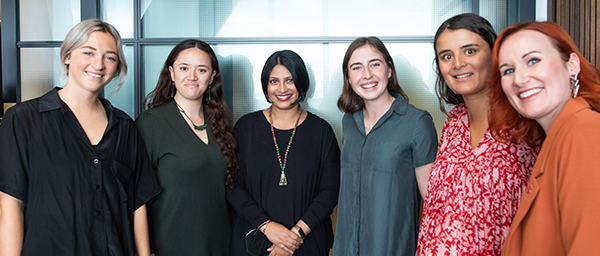Community
Forsyth Barr is proud to support The Prince’s Trust
Back in 1976, the then Prince of Wales and now King Charles III, had just completed his compulsory military service. He was in his 20s and used his severance pay to set up The Prince’s Trust charity in the UK in an effort to help vulnerable young people between the ages of 18-30 get their lives on track.
In 2015 the scheme expanded internationally, mostly to Commonwealth nations, and more than one million young people around the globe have now been supported on their journey from education to employment since it was established.
After the pandemic and the ongoing increases to the cost of living, things are only getting tougher for young people, says Rod Baxter, the CEO of the Prince’s Trust Aotearoa New Zealand.
“The challenges around young people and financial independence are quite acute at the moment. When we think about youth, we often think about teenagers and school students, but over 18 year olds are staying younger for longer. Many have to stay at home, they can’t be that independent and it’s harder to start a family now. Maybe just one generation ago, someone in their 20s could buy a house, but that’s impossible now without financial assistance.”
Understanding what drives people
More young people are also rethinking how they want to make a living. There’s a thirst for more meaningful work and more autonomy.
“Lots of young people are asking themselves why they’re working in bad jobs, or how they can supplement their income with a side hustle.”
The main goal of the organisation is to give young people the tools they need to find their purpose in life and the Prince’s Trust enterprise programme - an intensive short course that can be done online or in person - is a major part of that process.
“If they decide that starting a business is for them, that’s great, but if not, they will be a better employee or they might decide they want to study or volunteer. Any outcome is positive, because it supports young people to take charge and find out how they want to make a contribution and a living.”
Around 1,000 young New Zealanders have been through the enterprise course so far, Baxter says, and those who do want to start a business can be matched with an experienced mentor. They’re also able to apply for funding through the He Kākano fund, which was launched in mid-2022.
Collective contributions
The Ministry of Youth Development provided $1 million towards He Kākano and Baxter says it has been matched dollar-for-dollar with donations from businesses and philanthropists.
“We have a pool of funds available to essentially give young people a grant, whether it’s an idea they want to test, a business they’re ready to launch or an existing enterprise they want to accelerate.”
Baxter says the demand has been very strong and they received more than 200 applications in the first two weeks.
“That was double our goal to fund 100 youth-led businesses over two years.”
About two-thirds of the applicants are rangatahi Māori, 70% are female and a large number are from provincial and rural New Zealand. Baxter isn’t sure why the Trust appeals to these demographics, but it “really bucks the stereotype in terms of who an entrepreneur is”.
“The young people coming to us - and they come to us through social media and through their own networks - I think they’re grateful for the charity that King Charles established. I’ve been a youth worker for over 25 years and I spent some time with 16 young Māori in Paihia with His Majesty when he visited in 2019 and the way he connects with young people is phenomenal.”
The broader community working together
The Prince’s Trust also aims to connect with the business community and government departments and one of its six values is mahi tahi, or ‘work as one’.
“We want to do nothing alone and always work with other groups. And that’s relevant to our partnership with Forsyth Barr … The Prince’s Trust sees itself as a supportive conduit to connect people and organisations that have the capacity and heart to help those in dire circumstances.”
The genesis of the partnership with Forsyth Barr, which is still in its early days, began when executive director Jonty Edgar joined a selection panel for He Kākano.
“I loved it and immediately wanted to come back and do another one. They are really inspiring days, you meet a bunch of amazing young people and we could quickly see the contribution that Forsyth Barr and its people could make”, Edgar explained.
It was in keeping with Forsyth Barr’s philosophy that time is often more important than money, and a number of staff have already signed up to be mentors for the programme and it is planning a bespoke training session for students in the next few months.
In describing the mentorships, Rod Baxter said “These will either be long term and relational with a formal connection over a couple of years or it could be a short burst with a specialist. Our ideal is that the mentor supports the young person to apply for funding and checks out the viability of the business.”
Baxter says those it selects often need more support than the average Kiwi to head down this pathway, but they benefit the most from that support.
A success story
He points to one He Kākano recipient, Blake Armstrong, as proof of the scheme working well - and not because he’s targeting earning a lot of money, but because of his increased sense of self-worth.
“When we met Blake he seemed like a lovely young man from Dunedin, and he told us about his photography business. Is that the most audacious thing? Probably not, but we backed him nonetheless. Afterwards, we discovered the reason he was a photographer was because he had a mental health incident that deleted some of his memory and reduced his capacity for short-term memory, so he took photos to remember where he was. What’s grown out of that adversity is a career, and we were able to offer support from some of the experienced photographers who have been doing it for a while as well as funding to help him upgrade his equipment and get training. It’s basically a social investment.”
Baxter says they didn’t define him by his problem. They backed his talent and potential and Forsyth Barr’s provision of mentors and a significant contribution into the funding pool has helped Blake and many other young people like him succeed.
To find our more, visit www.princes-trust.org.nz
Giving back to New Zealanders
Read the articles below to find out more about some of the groups and initiatives across the country that we support, or download our latest Forsyth Barr in the Community booklet.

Share My Super

Gut Cancer Foundation

